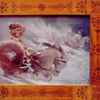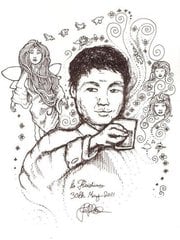Be sure to follow KMXT FreeForm Radio on Facebook and Bandcamp.
You can now listen to the livestream of the show through the KMXT app; it's available through the Mac App Store or Google Play.
Please support FreeForm Radio and KMXT by going to KMXT.org and pledging your support.
The
music you hear on tonight's show is available on the artists' Bandcamp
pages and websites. (links below)
We urge you to support the musicians you hear on FreeForm Radio.

It’s
always said that the second album by any band is the difficult one to
create and release. This could well have been the case for the duo
d’Voxx who launched their debut record “Télégraphe” (DiN58) on DiN in
2019 too much critical acclaim. Rather than continuing in the same vein
they have really raised the bar with a stunning sonic interpretation of
the classic twentieth century novel “1984” by George Orwell. Not only
that but they have the blessing and permission of the estate of the late
Sonia Brownell Orwell to not just use the novel’s title but to directly
quote from this seminal work.
Over the course of eight tightly focused tracks, which feature stunning
sound design, what unfolds is a musical work that really captures the
essence of this great work. Male and female voices quote from the novel
as modular systems churn and chatter around their syllables. Throbbing
sequence lines and incessant percussion grooves worm their way into your
consciousness as the overall sense of unease and paranoia is gradually
ramped up throughout the course of the album. Heartrending strings and
melodic themes twist and turn to superimpose an emotional layer over the
brutality of the underlying message.
Written in 1949 the dystopian themes of the novel seem
even more relevant today than when it was first published. Most
importantly the ways that truth and reality can be manipulated by
governments and large corporations seem to be an insidious force that
affects us all. This unique album by d’Voxx could well be the greatest
musical interpretation of this novel to date and is another milestone in
the burgeoning catalogue of the DiN imprint.
credits
Our thanks to Ian Boddy and DiN for supplying us with a promo copy of this release.
released November 18, 2022
Composed and produced by Nino Auricchio and Paul Borg.
Nino Auricchio plays Winston
Wendy Auricchio plays Julia
Paul Borg plays O’Brien
Mastered by Nino Auricchio
Cover image by Nino Auricchio
Designed by Jamie Currey
Special Thanks to Ian Boddy, Florence Reese & Bill Hamilton at A.M.
Heath, Penguin Random House, HMH Books & Media, Mark Roland &
Neil Mason at Electronic Sound Magazine.
This album is a musical interpretation of George Orwell’s 1949 novel, 1984.
Use of the album title 1984 and spoken text has been granted by permission of the estate of the late Sonia Brownell Orwell.
ambient
em
electronic
electronic music
electronica
eurorack
downtempo
eurorack modular
modular synth
Sunderland
Review by
DamoXt7942
FORUM & SITE ADMIN GROUP Avant/Cross/Neo/Post Teams

DEAF were an extremely obscure Swiss Krautrock outfit around 1970 and we can hear their "real"
soundscape only from their one and only compilation "Alpha" including the longest album-titled suite
and three live sessions. Of the whole album, such a mixture of heavy & peppery guitar-based kick and
drunken keyboard walk can notify us some fragrance of Krautrock.
From the beginning "No Time" we can be knocked out by freak out flute, percussive rhythm section,
simple and persistently fluctuate bass, and sometimes familiar sometimes heavy attacking Samuraish
rock ensemble. Against clear heavy rock texture, obscure voices (like this band's history ... cannot
understand what they said) are there. In the latter half, eerie keyboards catecholamine
intermittently follows drumming solo. A mysterious and interesting stuff. The second "Run You Off
The Hill" can shoot into our brain dreamy drowsy bluesy heavy missiles from Swiss Deaf-y launcher.
Basically a simple blues number, but simultaneously with groovy keyboard-based glimmering
psychedelia. In "The Galactic Pack Of Kari" a warped flute and a greasy acoustic guitar can be very
active and aggressive over the percussive rhythm stage especially in the middle part. Definitely not
a single poppy ballad but delightful tragedy theme we can hear alright?
The last Ravel's Boléro-based extreme suite "Alpha", one of their few and rare studio sessions,
should be absolutely beyond expression. Calm and gracious falsetto chorus with exotic, ethnic
woody-moody percussive melodies by flute and clarinet solos, plus a bit weird shouts, not entirely
united and polished but slightly scattered into each of instrumental pieces. Nutty and dry-fruity
merged organ sounds themselves can remind us some Kraut-ish keyboard-based soundshower. Quirky
percussion and a bass solo with spacey synthesizer-elevated tribal jamming ensemble is not
fundamentally honest at all but a bit whacked-out with merry-go-rounder flute sounds and complex,
flexible drumming. Certainly shoegazey garagey made-on-trip sounds follow the whackey bloody
footprints by struggle between a guitar and a synthesizer. Maybe they cannot be too soft nor too
heavy in the last part. Well-balanced bluesy boogie fever can rush into confusion world. We cannot
realize and well-read where and how this longest suite goes until the very last, and just after
listening to it, no fresh air nor comfort but something missing (maybe DEAF themselves I do
consider!) should be left around us surely.
Listen to the entire album, Alpha, by Deaf 1972
Studio Album, released in 1975Review by
apps79
SPECIAL COLLABORATOR Honorary Collaborator

3.5 stars...
Short-lived but worth hearing,GRANADA were the brainchild
of multi-instrumentalist/vocalist Carlos Carcamo,who started this
project in 1974 in Madrid.Musicians would come and go,before Carcamo
found a stable trio for the guitar/bass/drums section,while he was
responsible for the vocals and the rest of the instruments,including
violins,keyboards,accordion and flutes.
''Hablo de una tierra''
came out a year after GRANADA's formation and it is an album of pure
progressive rock with different influences and sounds.In this work
mellotrons and pianos battle with Spanish folklore through flamenco
guitars and accordion,while a jazzy feeling tries to capture the
symphonicism of the album.Carcamo does an excellent job,especially his
mellotron playing is dreamy and nostalgic,while he also handles the
flutes in a fine way,sometimes in a softer style,while others he marks
JETHRO TULL's Ian Anderson as a big influence.I'm not really sure if he
is also responsible for the flamenco guitars,but this blending of
Spanish sounds with nice keys and backing vocals is also very
attractive,not far from what co-patriots TRIANA were trying around the
same time.Besides this flamenco stuff,the album contains also a fair
amount of acoustic passages with backing mellotron and flutes and a
balanced dose of vocals to make it even more interesting and worth
searching for,while several Italian bands of the same style come to mind
(PREMIATA FORNERIA MARCONI, BLOCCO MENTALE, OSANNA,QUELLA VECCHIA
LOCCANDA).This is absolutely fascinating Spanish flamenco-tinged
symphonic rock with tons of romanticism and a relaxed but atmospheric
dimension.Recommended!
Hear the entire album here.








 DEAF were an extremely obscure Swiss Krautrock outfit around 1970 and we can hear their "real"
soundscape only from their one and only compilation "Alpha" including the longest album-titled suite
and three live sessions. Of the whole album, such a mixture of heavy & peppery guitar-based kick and
drunken keyboard walk can notify us some fragrance of Krautrock.
DEAF were an extremely obscure Swiss Krautrock outfit around 1970 and we can hear their "real"
soundscape only from their one and only compilation "Alpha" including the longest album-titled suite
and three live sessions. Of the whole album, such a mixture of heavy & peppery guitar-based kick and
drunken keyboard walk can notify us some fragrance of Krautrock.












